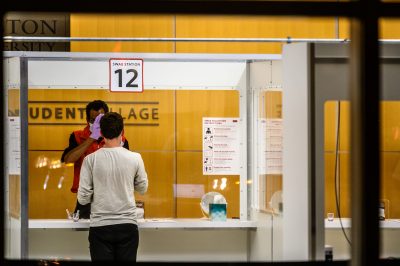Between mask-wearing, social distancing and Learn from Anywhere classrooms, this is a semester of firsts at Boston University. The Clinical Testing Lab, the epicenter for BU’s COVID-19 testing policy, is yet another first — and the only one of its kind in Boston.

Douglas Densmore, an associate professor in the College of Engineering, is the founder of the Design, Automation, Manufacturing and Prototyping Lab, where BU’s automated testing procedures take place.
Densmore wrote in an email that it takes a team effort for the Lab to efficiently and accurately process samples. The Lab utilizes specially engineered robots with the capability to handle nearly 6,000 coronavirus tests a day.
“The key to getting the BU Clinical Testing Lab up and running was the high level of focus and coordination within the overall team to get the job accomplished,” Densmore wrote. “The challenge was tuning the robots to the actual liquids being used, calibrating the movement of the robots and accounting for labware variations.”
As robots work behind the scenes, students line up en mass at four testing sites for asymptomatic test takers across the Charles River Campus, self-administering anterior nares swabs under the direction of BU staff.
BU’s testing protocols require that all undergraduate students attending in-person classes are tested twice a week.
Evan Laufman, a freshman in the College of Communication, said the procedure is easy to follow and the testing staff provide simple instructions.
“We get to do the tests ourselves, which has been very comfortable,” Laufman said. “Whenever I’ve gone there, it’s been very fast and convenient and the workers there lead you through everything.”
This ease in testing was a purposeful part of BU’s planning. Gloria Waters, vice president and associate provost for research, wrote in an email sent through BU spokesperson Colin Riley that the University’s decision to use a more superficial swab as opposed to respiratory tests was to ensure test-takers would be willing to continue their COVID-19 testing throughout the semester.
“The main reason to use the [anterior nares] test is that it is much more comfortable for the user and more likely to result in compliance with repeated testing,” Waters wrote. “Compliance by students is being tracked carefully by the Dean of Students Office and for faculty/staff by [Human Resources].”
Several students said positive experiences have made it easy for them to keep up with these testing requirements, as well as other policies aimed at limiting the spread of COVID-19 on campus. COM junior Jackson Cusick said he’s noticed a high compliance rate among students, which eases his concerns.
“Everyone seems to be wearing masks,” Cusick said. “[My friends are] all following the guidelines of three negative tests and continuing testing after.”
Since the pilot program began July 27, BU has administered more than 60,000 tests, but as the volume of testing has ramped up, new concerns have come to light.
The average processing time for samples has increased significantly — from less than 24 hours through Aug. 24 to 30.2 hours Monday, according to BU’s COVID-19 Testing Data Dashboard.
Waters wrote that BU intends to turn over results quickly, and that a larger staff and longer work hours should shorten that waiting period.
“Our goal is to return results next day. We have increased the hours of the staff in the lab to take care of the backlog and hope to be back on track in a few days,” Waters wrote. “We are just in the process of ramping up the lab and will put in place whatever is required to keep our goal of returning results next day.”
The promise of fast, accurate and effective testing has given a feeling of safety to on-campus students, among them Matthew Suny, a junior in the Wheelock College of Education and Human Development. Suny wrote in a Facebook comment that school-wide testing has eased his concerns about being back at BU.
“Mass testing is the only reason I felt comfortable returning to campus,” Suny wrote.
As of Monday, BU is at a cumulative positivity rate of 0.11 percent, according to the dashboard. However, a higher number of cases may exist due to potential false negatives.
Catherine Klapperich, director of COVID-19 testing at BU, wrote in an email sent through Riley that the reverse transcription-polymerase chain reaction test is highly accurate, so BU will continue to rely on nasal swabbing.
“It is better than 95% sensitive and specific – that is required, or we cannot continue to run the test,” Klapperich wrote. “We must validate that on a routine schedule and if we make any changes to the assay.”
A Brink article in August, however, stated Klapperich said RT-PCR is 80 to 90 percent accurate.
Along with frequent testing, BU community members are tasked with completing a daily symptom attestation via Patient Connect. Andy Pham, a freshman in the College of Arts and Sciences, said he thinks the questions are important in catching the onset of the coronavirus, and that the survey should be taken more seriously.
“A lot of us treat the symptom reporting kind of nonchalantly. And I admit, some days I’ve gotten into the habit of flying past all 15 [questions],” Pham said. “I worry if that becomes a habit, that might be a problem. Or we see a symptom and then we blame it on something else instead of being safe.”
Pham added that BU students must continue to hold each other accountable to ensure they can stay on campus.
“When we saw that email from the Dean about we shouldn’t become like Notre Dame, like the other schools, we understood the sentiment,” Pham said. “I think we can be proud of BU’s testing policies, but still not fall into the sentiment that everything’s safe now.”



























































































































Mj • Sep 8, 2020 at 5:05 pm
Very well written!!